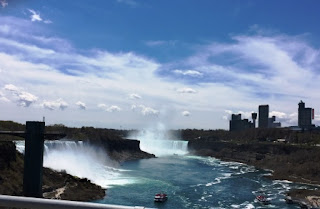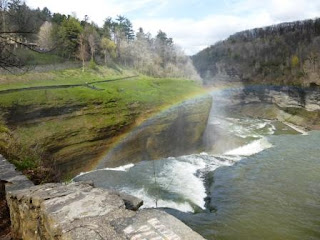Water, Water Everywhere
So our plan to move north to Canada was scuppered by the elements. We left Gettysburg PA after a week of cold rain and
moved on to western New York State with little hope of getting any warmer
weather. I decided to contact my friend
Karen whom we had intended to visit at their cottage retreat two hundred miles north
of Toronto. Snow was still a possibility
up there, with night time temperatures around freezing, so I proposed that instead
of towing our trusty trailer The Jet with us, we would leave it out to pasture
in the green field it was currently sinking its tyres into, and just drive our
truck Benny 200 miles to Toronto where Karen and her partner Dave have a house. As we couldn’t leave the Jet for too long, we
decided that a long weekend instead of the two weeks we had planned would have
to suffice for this year’s visit. The
cold was seeping into my husband Richard’s and my bones and we intended not to
out-wait the weather but head south and west to hopefully warmer climes as soon as we got
back.
The weather did dry up during the week, and when we arrived
in Toronto on Friday the 6th May, there was even a mini heatwave
on. 70 degrees Farenheit (21 Centigrade) no less, and Karen and
Dave were busy preparing their pool for us to use whilst we were there. However, it took until Sunday to heat up the
water, by which time the air temperature had dropped. At 85F (29C) degrees, it was very
comfortable in the pool, but getting out into an ambient temperature of 55F (13C) degrees was another matter! I vowed my next swim would not happen until summer
was well underway.
In fact, for some reason, water has featured very much in
our lives over the last few weeks.
Mostly, thank goodness, we were just looking at it!
Unsurprising really, as we were located in the Finger Lakes
area of New York, which has an abundance of rivers, waterfalls, 29 state parks
and 11 Finger Lakes (called this because
they are... yes – you’ve guessed – finger shaped). By the way, entrance to state
parks is generally free in New York and Pennsylvania. At weekends there is
often a parking fee applied.
The Appalachians were formed as a result of plate collision
and tend to be elongated belts of folded and thrust faulted marine sedimentary
rocks, volcanic rocks and slivers of ancient ocean floor. My knowledge, you may say, is pretty
impressive – but that is mainly due to the Geology Course DVD Richard bought me
for my birthday in January. (I should
have foreseen this, because he gave me a rock hammer for Christmas!)
All that water erosion
down glacially steepened hillsides has created some fabulous gorges, with
dripping shale walls, splendid roaring waterfalls, and amazing ecosystems with
mixes of rain-forest and desert loving plants growing on light and dark slopes. I’ll
let the photos do the talking:
Niagara Falls
Bubba! The sheer
force thunders at you
Letchworth State Park NY
Our first experience before Niagara, and the rest, and we were very impressed with these three waterfalls…
Watkins Glen State Park NY
Sculptured chasms and 19 waterfalls within a mile long
gorge. Breathtakingly beautiful as each
new vista opens up along the 880 steps of the gorge trail!
We have spent the last few days just south of Pittsburgh,
PA, and water is not that far away here either, though the hills are a little
steeper and more rolling, and the rivers smaller and less surging, and the
small man-made lakes are still and full of algae.
Yet we did come across something special – a house built to sit over water. American designer/architect Frank Lloyd Wright believed in designing structures that were in harmony with humanity and its environment, a philosophy he called organic architecture. Fallingwater, one of Wright's most famous private residences, built from 1934 to 1937, was designed according to his desire to place the occupants close to the natural surroundings, with a stream and waterfall running under part of the building. Wright wanted the residents to live with the waterfalls, to make them part of their everyday lives. Typically Wrightian is the joining of the structure to its site by a series of terraces that reach out into and reorder the landscape. To unify the house to its site, Wright often used large expanses of glass to blur the boundary between the indoors and outdoors.
Yet we did come across something special – a house built to sit over water. American designer/architect Frank Lloyd Wright believed in designing structures that were in harmony with humanity and its environment, a philosophy he called organic architecture. Fallingwater, one of Wright's most famous private residences, built from 1934 to 1937, was designed according to his desire to place the occupants close to the natural surroundings, with a stream and waterfall running under part of the building. Wright wanted the residents to live with the waterfalls, to make them part of their everyday lives. Typically Wrightian is the joining of the structure to its site by a series of terraces that reach out into and reorder the landscape. To unify the house to its site, Wright often used large expanses of glass to blur the boundary between the indoors and outdoors.


















Comments
Post a Comment